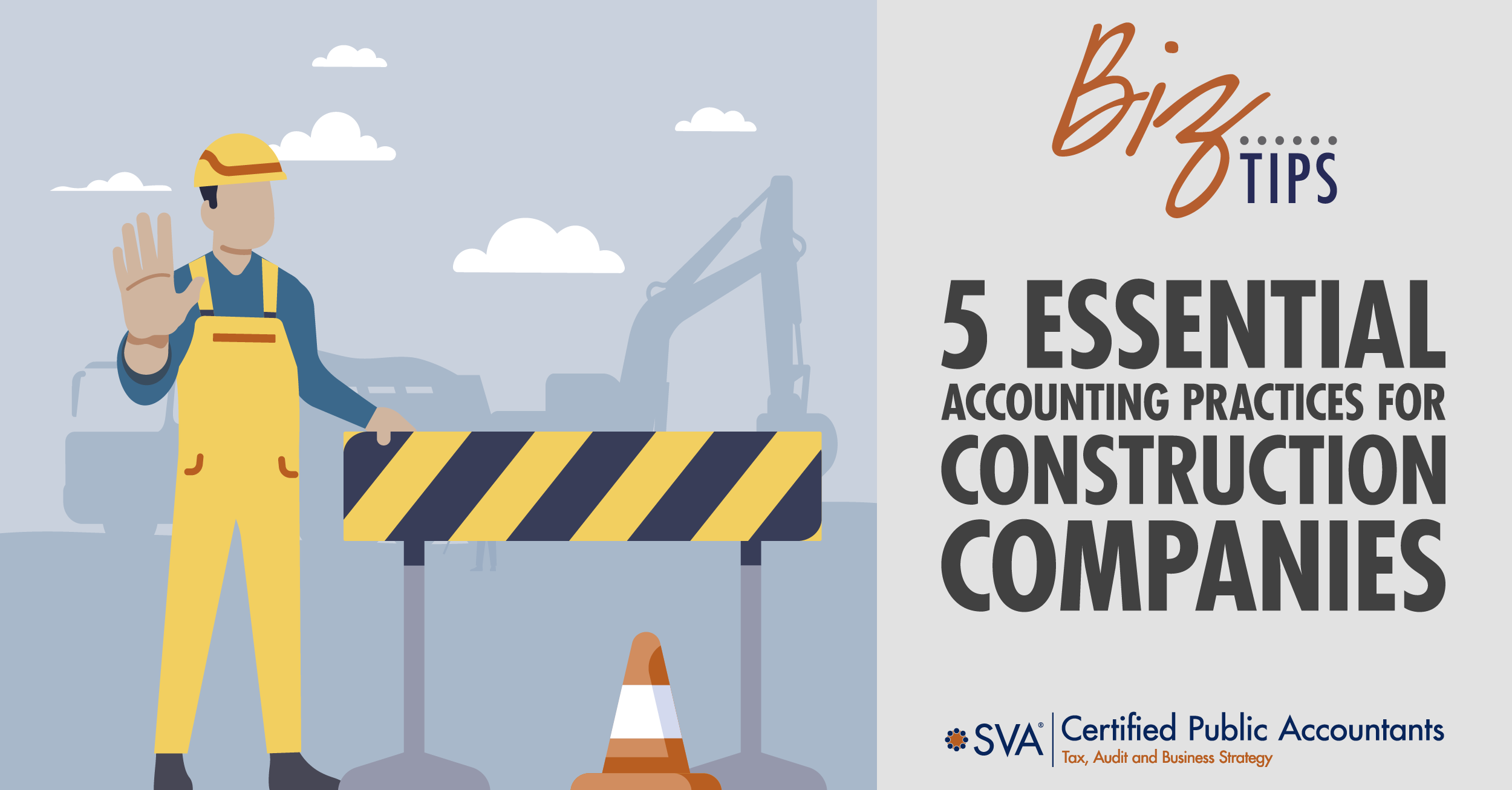| Highlights: |
- Outlines five core accounting practices—project cost estimation, job-level cost tracking, cash flow management, tax planning, and construction-specific software—for construction businesses.
- Emphasizes tailoring financial management to project-based work, improving profitability insights, compliance, and operational decisions.
- Shows how using technology and detailed reporting can streamline operations, enhance budgeting accuracy, and support long-term financial success.
|
Effective accounting in the construction industry hinges on more than general financial know-how. It demands tailored practices that align with project-based work, fluctuating costs, and complex compliance standards.
Core strategies like job-level cost tracking, informed revenue recognition, and the use of construction-specific software provide a financial foundation that supports accurate bidding, sustainable cash flow, and long-term profitability.
5 Construction Accounting Practices
Let's explore five essential accounting practices tailored specifically for the construction industry. By implementing these practices, construction businesses can enhance their financial stability, streamline operations, and make informed decisions. Let's dive in!
1. Project Cost Estimation and Budgeting
Accurate project cost estimation and budgeting play a vital role in construction accounting. Detailed estimates and budgets are the backbone of construction project management. They help steer the project towards timely and profitable completion while safeguarding the interests of all stakeholders involved.
The key inputs for project cost estimation and budget are labor, materials, equipment, and overhead expenses.
Labor
This is usually one of the biggest expenses in construction projects. Accurate estimation helps ensure the proper workforce is hired and paid competitively, which will help reduce the risk of labor disputes or shortages.
Materials
An accurate estimation of materials needed for a project will help ensure the required materials are purchased in a timely manner and in the right quantity. A misstep here can lead to wastage or delays due to material shortage.
Equipment
For most construction projects, equipment is needed, whether it is purchased or rented. There is also the cost of operating the equipment, including fuel and maintenance costs. Proper equipment estimation will help make sure the right equipment is available at the right time, saving time and money.
Overhead Expenses
Don’t forget to account for overhead expenses when estimating project costs. Direct overhead expenses are specific to a project and may include temporary rentals, utilities, fencing, and water supplies. Indirect overhead expenses are day-to-day costs of running your business, such as rent, administrative salaries, utilities, taxes, depreciation, and advertising. Accurately tracking and including these in your project cost estimation will allow you stay in control of your costs.
One other factor that plays into whether a project is successful is an accurate estimate of when the project will be completed and the related timeline. This estimate helps ensure that a project can be finished within the allocated time and resources. Without it, a project may run out of funds before completion, causing potential work stoppages or abandonment.
2. Job Costing and Reporting
Job costing is the process of tracking costs and revenues for each project. Accurate job costing can help you do the following:
| Understand the Profitability (or lack thereof) of Each Project |
As job costing breaks down each input into a project, you can track profitability individually. |
| Compare Actual Costs to Estimates |
Managing and analyzing estimates allows you to better price jobs in the future. |
| Identify Areas of Inefficiency or Excess Costs |
By identifying these items while the project is being completed, you avoid surprises at the end of the project and can address (and hopefully avoid) them in future projects. |
Another tool to help track jobs is a work-in-progress (WIP) schedule. A WIP schedule can be completed monthly, quarterly, semi-annually, or annually, and includes project data such as contract value, costs incurred to date, total estimated costs, and total project billings.
This schedule provides real-time insight into estimated earnings vs. billings and can also help you manage and forecast your cash flow.
3. Cash Flow Management
Cash flow management is crucial for construction companies, given the industry's unique challenges such as long project cycles, upfront material and labor costs, and fluctuating demand.
By better managing their cash flow, construction companies can ensure they have the funds needed to sustain operations, invest in growth opportunities, and navigate the cyclical nature of the construction industry.
4. Tax Planning and Compliance
Construction companies face a range of tax issues that require careful preparation and management. Understanding and preparing for these issues is crucial for compliance and optimizing tax positions.
Proper planning can help companies follow tax laws, avoid penalties, and potentially benefit from tax savings and incentives. It is often advisable for companies to seek guidance to navigate these complex issues effectively.
(Download Video Transcript)
5. Software Solutions for Construction Accounting
Software can significantly enhance the accounting processes of a construction company, bringing efficiency, accuracy, and strategic insights. Here are some ways that software can be beneficial:
| Automated Job Costing |
Accounting software can automate the job costing process, accurately tracking costs associated with specific projects. This includes labor, materials, subcontractors, and equipment, ensuring that every expense is allocated to the right job. |
| Real-Time Financial Reporting |
Software allows for real-time tracking of financial data. This enables construction companies to have up-to-date financial reports, helping in making timely business decisions based on current financial status. |
| Improved Cash Flow Management |
With features like automated invoicing, payment tracking, and expense management, software helps in managing cash flow more effectively. It can provide forecasts and alerts for potential cash flow issues. |
| Efficient Payroll Processing |
Construction accounting software can handle complex payroll requirements, including union, certified, and prevailing wage rates, as well as different pay rates for different jobs or tasks. |
| Integration with Other Systems |
Many accounting software solutions can integrate with other systems such as project management tools, Customer Relationship Management (CRM) systems, and HR software, providing a seamless flow of information across the company. |
| Enhanced Compliance and Audit Trails |
The software ensures that accounting practices comply with industry standards and regulations. It also provides a clear audit trail, which is essential for financial audits and compliance checks. |
| Budgeting and Forecasting Tools |
Advanced software offers budgeting and forecasting capabilities, allowing construction companies to plan future projects more accurately and manage their finances proactively. |
| Document Management |
Construction projects involve a lot of documentation. Accounting software can store and manage these documents, including contracts, change orders, invoices, and receipts, making them easily accessible and reducing paperwork. |
| Error Reduction |
Manual data entry is prone to errors. Software automates many accounting processes, reducing the likelihood of errors and ensuring the accuracy of financial data. |
| Customizable Reporting |
Construction companies can generate customized reports that are tailored to their specific needs, providing insights into project profitability, cost variances, and other key performance indicators. |
| Scalability |
As the company grows, accounting software can scale to meet increased demands, supporting more users, larger data volumes, and additional projects without a loss in performance. |
| Improved Vendor and Subcontractor Management |
The software can track and manage payments to vendors and subcontractors, ensuring timely payments and maintaining good relationships. |
| Tax Preparation and Filing |
Accounting software can assist in tax preparation and filing, ensuring that all relevant financial activities are accurately reported and taxes are filed on time. |
| Mobile Access |
Many modern software solutions offer mobile access, allowing project managers and other staff to view financial data, enter information, and make decisions on-the-go. |
By implementing these five essential accounting practices, construction companies can gain a competitive edge in the industry. Strong financial management enables better project cost control, improved cash flow, enhanced tax planning, and streamlined operations.
Incorporating construction-specific accounting techniques and leveraging technology solutions allow construction businesses to thrive financially and pave the way for long-term success.
© 2023 SVA Certified Public Accountants

